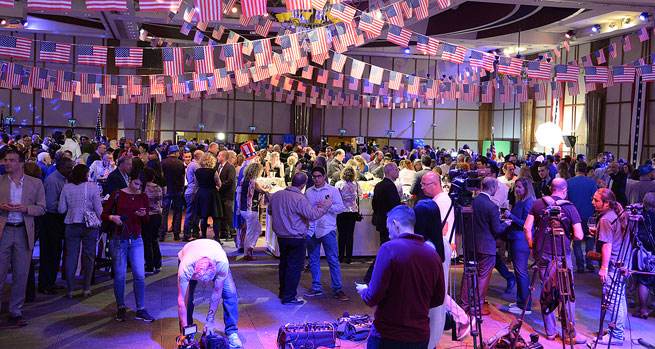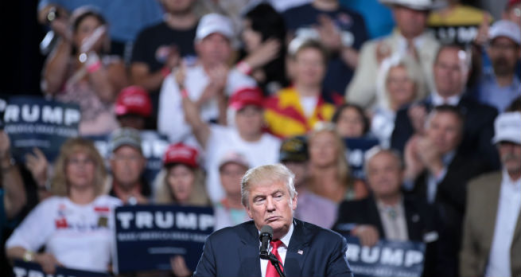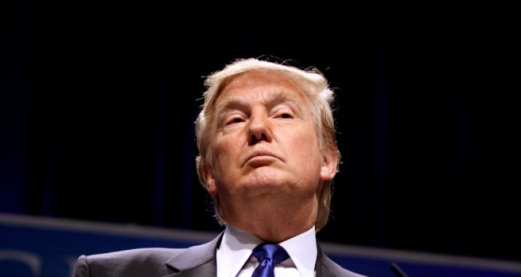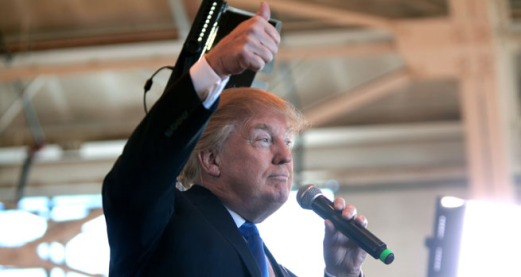 The US embassy in Tel Aviv marks election night, 2016
The US embassy in Tel Aviv marks election night, 2016
1) Israeli settlers are massive Trump fans
I spent this morning wandering around an illegal Israeli settlement on the outskirts of the Palestinian city of Hebron, asking people a simple question: Trump, or Clinton? The results were overwhelming: a clear majority were Trump supporters, and the rest either didn’t know, didn’t care, didn’t speak English, hated journalists, or were Alex Jones fans. Well, there was only one Alex Jones fan. But it was a bit odd to hear anti-Semitic conspiracy theories from a guy in an Israeli settlement. There was also one person who vaguely hoped Clinton won, though he seemed to imply he wasn’t from the settlement.
There were basically two reasons people gave for their enthusiasm for the Republican candidate: he is “good for Israel” (or “good for the Jews” as about half of them put it), and they like him. One young man said that Hillary is “too politically correct” while Trump is “a straight talker, and this region needs straight talkers.” Another young guy – an Israeli soldier – told me that he hoped Trump won “because he is a strong man and Hillary is a girl”. Another said that “The Democrats prefer Arabs.” Others were more nuanced: “he is mad, but Hillary supports Palestine more.”
Trump’s support wasn’t universal there, though another man – probably in his early thirties – said “they are both bad for Israel. And Israel’s not supposed to depend on them anyway!”
2) Most Palestinians think it won’t make any difference to them
I spent yesterday in Jericho and the Aqabat Jaber refugee camp next door, and today in Hebron and, briefly, Bethlehem. Again, I was going round cafes, and talking to people in the street, asking them their opinion about the US election.
In all three places, the most common answer was the same: that it wouldn’t make any difference. As an older man in Aqabat Jaber said to me “I remember Carter, Reagan, Bush, Clinton, Obama: they are all the same. All promised a Palestinian state. None have delivered.”
A few went into some more depth, talking about the role of money and the Israeli lobby in American politics – and, once or twice, people veered towards anti-Semitic conspiracy theory territory. But more often, they just talked about how presidents can’t change much anyway – it’s their advisers, or Congress, or both, who matter. And, most of the time, they expressed a simpler exasperation.
3) But lots of Palestinians are rooting for Hillary Clinton anyway
There are significant numbers of Palestinians supporting Hillary Clinton. Despite thinking she won’t help their situation, these people largely reflected the attitudes you’d find in the UK. Peter, a Christian in Jericho, is following the polls closely. He is worried about a Trump victory: “he’s a very dangerous man”. A group of young men in Bethlehem thought Trump is sexist and racist, and “a very bad man”. In Hebron, outside a butchers shop where a camel was being gutted, A middle aged man put it bluntly: “Trump is a fascist”. Others talked highly of Hillary Clinton’s diplomatic skills, and a number said that Democrats are better for social security.
Thanks to Badee Dwaik of Human Rights Defenders in Hebron for translating in this video.
4) And there are a few Palestinians hoping for a Trump victory
It was a very small minority, but I did find some Trump supporters among the Palestinian population that I encountered. But their reasons were very different from those of the Israeli settlers. As Abu Saleh put it: “Trump is honest: he hates Muslims. He says ‘fuck you’ to your face. The others think it, but they don’t say it to our face, so at least he is honest.” I was told by an American man living in Jericho, that others are hoping for a Trump victory because they think he will be a disaster for the US, and they think the American system is utterly corrupt, and deserves him.
5) There are mixed feelings about Obama
While the most common attitude among Palestinians seems to be that Obama has been the same as all presidents before him, I did come across a view on both sides of the divide that differed a little from this: one man in Bethlehem said that he didn’t like Clinton or Trump, and he wished Obama could stay on because “he’s a good man”. And one of the enthusiastic Trump supporting settlers, amidst a rant about how much of a ‘thief’ Clinton is, admitted that he thought she’d be better for Israel than Obama has been.
6) People remember Obama’s broken promise on Guantanamo bay
More than one person I spoke to used Guantanamo as their key evidence that US presidents promise things, but fail to deliver.
7) Not everyone knows who Donald Trump is
On the whole, the people I spoke to (who were usually from the self-selecting sub-sample of people who spoke English or were with someone who did) knew a fair amount about the election. More than one Palestinian was following the polls regularly. But I also met a number of people who knew exactly who Hillary Clinton is, but who weren’t aware of Donald Trump – a slight against his ego which I confess I enjoyed a little.
8) It was hard to get opinions from women
Both among Palestinians and among Israeli settlers, fewer women spoke English, and those who did were less likely to be willing to express a view. So the above is, in both counts, largely (but not entirely) what men said. Clearly, in an election so defined by gender, that’s a problem.
This article was originally published by OpenDemocracy under a CC-BY-NC licence




Rate and Review
Rate this video
Review this video
Log into OpenLearn to leave reviews and join in the conversation.
Video reviews